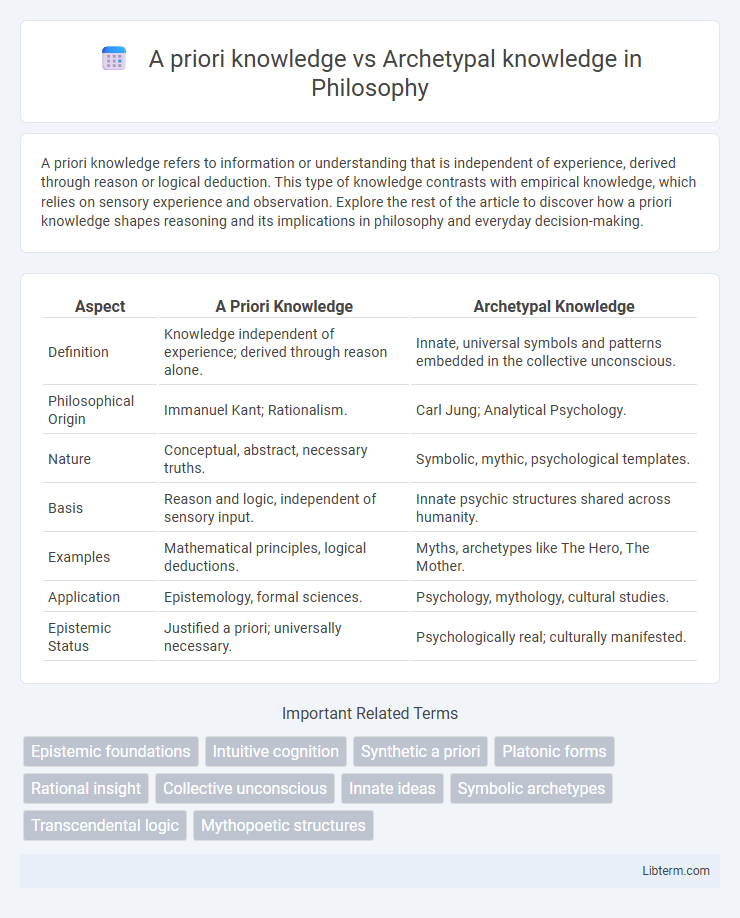A priori knowledge refers to information or understanding that is independent of experience, derived through reason or logical deduction. This type of knowledge contrasts with empirical knowledge, which relies on sensory experience and observation. Explore the rest of the article to discover how a priori knowledge shapes reasoning and its implications in philosophy and everyday decision-making.
Table of Comparison
| Aspect | A Priori Knowledge | Archetypal Knowledge |
|---|---|---|
| Definition | Knowledge independent of experience; derived through reason alone. | Innate, universal symbols and patterns embedded in the collective unconscious. |
| Philosophical Origin | Immanuel Kant; Rationalism. | Carl Jung; Analytical Psychology. |
| Nature | Conceptual, abstract, necessary truths. | Symbolic, mythic, psychological templates. |
| Basis | Reason and logic, independent of sensory input. | Innate psychic structures shared across humanity. |
| Examples | Mathematical principles, logical deductions. | Myths, archetypes like The Hero, The Mother. |
| Application | Epistemology, formal sciences. | Psychology, mythology, cultural studies. |
| Epistemic Status | Justified a priori; universally necessary. | Psychologically real; culturally manifested. |
Introduction to A Priori and Archetypal Knowledge
A priori knowledge consists of information that is independent of experience and can be known through reason alone, such as mathematical truths and logical deductions. Archetypal knowledge, rooted in collective unconscious theory, refers to universal patterns and symbols shared across cultures that shape cognition and behavior. Understanding these concepts highlights the distinction between innate, reason-based knowledge and inherited, symbolic understanding.
Defining A Priori Knowledge
A priori knowledge refers to knowledge that is independent of experience, derived through reason and logical deduction rather than sensory input. It encompasses truths such as mathematical principles and tautologies, which are universally necessary and knowable without empirical verification. This form of knowledge contrasts with archetypal knowledge, which is often linked to innate patterns and symbolic representations embedded within the human psyche or collective unconscious.
Exploring Archetypal Knowledge
Archetypal knowledge represents universal, innate patterns embedded in the collective unconscious, shaping human experiences and behaviors across cultures and history. This form of knowledge transcends empirical observation, relying on symbolic motifs and mythological frameworks that resonate deeply within the psyche. Exploring archetypal knowledge reveals how these primordial images influence art, literature, and psychological development, providing insight into shared human consciousness beyond purely rational or a priori reasoning.
Philosophical Roots and Historical Context
A priori knowledge, rooted in the philosophy of Immanuel Kant, refers to knowledge independent of experience and gained through reason alone, emphasizing necessary and universal truths. Archetypal knowledge, deriving from Carl Jung's analytical psychology and ancient mythological traditions, represents innate, universal symbols and themes embedded in the collective unconscious. Historically, a priori concepts emerged in classical rationalism while archetypal knowledge connects to the study of timeless human narratives and the unconscious mind's influence on cognition and perception.
Key Differences Between A Priori and Archetypal Knowledge
A priori knowledge is independent of experience and derived through reason or logic, such as mathematical truths or tautologies, whereas archetypal knowledge is innate, universal patterns or symbols embedded in the collective unconscious as proposed by Carl Jung. A priori knowledge emphasizes epistemological justification that does not rely on sensory input, while archetypal knowledge involves unconscious cognitive structures shaping perception and behavior across cultures. Key differences include a priori knowledge's rational, explicit nature contrasted with archetypal knowledge's intuitive, symbolic essence rooted in shared human experience.
Examples of A Priori Knowledge
A priori knowledge includes examples such as mathematical truths like 2+2=4, logical deductions like "all bachelors are unmarried," and geometric principles such as the sum of angles in a triangle equaling 180 degrees. This type of knowledge is independent of sensory experience and is known through reason alone. In contrast, archetypal knowledge relates to inherited, universal symbols or patterns derived from collective unconscious, rather than purely rational understanding.
Instances of Archetypal Knowledge
Instances of archetypal knowledge encompass innate, universal patterns and symbols embedded in the collective unconscious, as theorized by Carl Jung. These include primal motifs such as the Hero, the Shadow, and the Mother, which manifest across cultures and generations in myths, dreams, and art. Unlike a priori knowledge, which derives logically from reason alone, archetypal knowledge is accessed through deep psychological and cultural resonance rather than abstract deduction.
Implications for Epistemology and Psychology
A priori knowledge refers to understanding derived independently of experience, grounded in logic and innate concepts, while archetypal knowledge encompasses deep, universal patterns rooted in collective unconscious. These distinctions impact epistemology by challenging the sources and limits of human knowledge--questioning whether knowledge arises from reason alone or shared symbolic structures within the psyche. In psychology, a priori knowledge highlights cognitive capacities for abstract reasoning, whereas archetypal knowledge informs models of mindset, myth, and personality, shaping interpretations of human behavior and mental processes.
Contemporary Debates and Interpretations
Contemporary debates on a priori knowledge versus archetypal knowledge center on their epistemological roles and cognitive foundations, where a priori knowledge is defined as independent of experience and archetypal knowledge as innate, universal patterns embedded in the collective unconscious. Philosophers like Immanuel Kant emphasize a priori synthetic judgments as essential to human understanding, while Carl Jung's archetypal theory highlights symbolic templates shaping human cognition and culture. Current interpretations explore the intersection of cognitive science and philosophy, questioning whether archetypal knowledge can be empirically validated or remains a metaphysical construct distinct from formal a priori reasoning.
Conclusion: Integrating Insights from Both Knowledge Types
Integrating a priori knowledge, which stems from innate reasoning and logical deduction, with archetypal knowledge, drawn from universal symbols and collective unconscious patterns, enhances cognitive frameworks by balancing rational analysis with intuitive understanding. This synthesis fosters deeper insight into complex phenomena, enabling more holistic decision-making and creative problem-solving. Leveraging both types of knowledge supports a comprehensive approach that transcends the limitations of purely empirical or purely symbolic interpretations.
A priori knowledge Infographic

 libterm.com
libterm.com